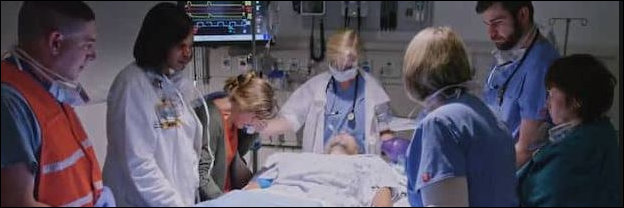What a shock! Virginia’s Medicaid expansion isn’t working out as planned. Today we learn that Virginia’s private hospitals, which are paying a tax to defray the state’s 10% share of expansion (Uncle Sam pays the rest), is on track to receive only 78% of the Medicaid revenue they expected, reports the Richmond Times-Dispatch.
The big question is whether the shortfall is a one-time event caused by a slower-than-expected rollout of the program or a permanent feature of the healthcare landscape.
Department of Medicaid Assistance Services (DMAS) estimated that the influx of 300,000 to 400,000 Medicaid patients would increase hospital industry revenues by $247 million in the second half of the 2019 fiscal year. So far, the actual net increase is on pace for $192 million for the six-month period. The hospital lobby agreed to the tax in the expectation that a surge in Medicaid revenue would more than offset it.
“We’re rolling out a little bit more slowly than anticipated,” said Chris Gordon, chief financial officer for DMAS. “We’re continuing to monitor and adjust our forecast. We continue to learn from experience.”
This missed forecast follows an even bigger snafu in which DMAS discovered late last year that it had underestimated regular Medicaid program costs by $462.5 million, requiring a major rewrite to the budget.
DMAS and the hospitals say it’s too early to draw definitive conclusions about the shortfall in hospital revenues. One reason for the lower-than-forecast revenue number might be that a smaller number than expected of newly enrolled Medicaid recipients sought medical care, suggests Julian Walker, spokesman for the Virginia Hospital and Healthcare Association.
Another possible reason, he said, might be that some of the people newly enrolled in Medicaid left the Affordable Care Act (ACA) marketplace. Medicaid pays less than do private insurers participating in the ACA marketplace.
Wouldn’t it be something if Medicaid expansion worked to undermine the Affordable Care Act marketplace? I mean, who could have possibly foreseen the possibility that lower-income Virginians in the Obamacare marketplace, who had to pay for their medical insurance (albeit at subsidized rates), might choose to enroll in the free Medicaid program instead?
If Walker’s suggestion is true — and it’s only a hypothesis at this point — the numbers will be reflected by a commensurate and “unexpected” loss of Virginians enrolled through the ACA marketplace. The migration to Medicaid could be a good thing or bad thing for those remaining in the ACA marketplace, depending upon whether those making the switch are sicker (thus costing more) or healthier than other ACA enrollees.
I predicted problems based on the shortage of physicians in Virginia willing to take Medicaid patients. (Medicaid pays so little that it is a money loser for physicians.) If Medicaid recipients can’t find a doctor to provide primary care, they are less likely to be referred to hospitals. On the other hand, sick Medicaid patients might be more likely to seek treatment in hospital emergency rooms where they can’t be turned away — a trend that in theory should be possible to track by monitoring emergency room admissions.
One can only hope that someone in a position of authority is considering the full range of possibilities and tracking the numbers so policy makers can figure out what is happening. As a rule, public policy based on on reality is preferable to public policy based on wishful thinking.



